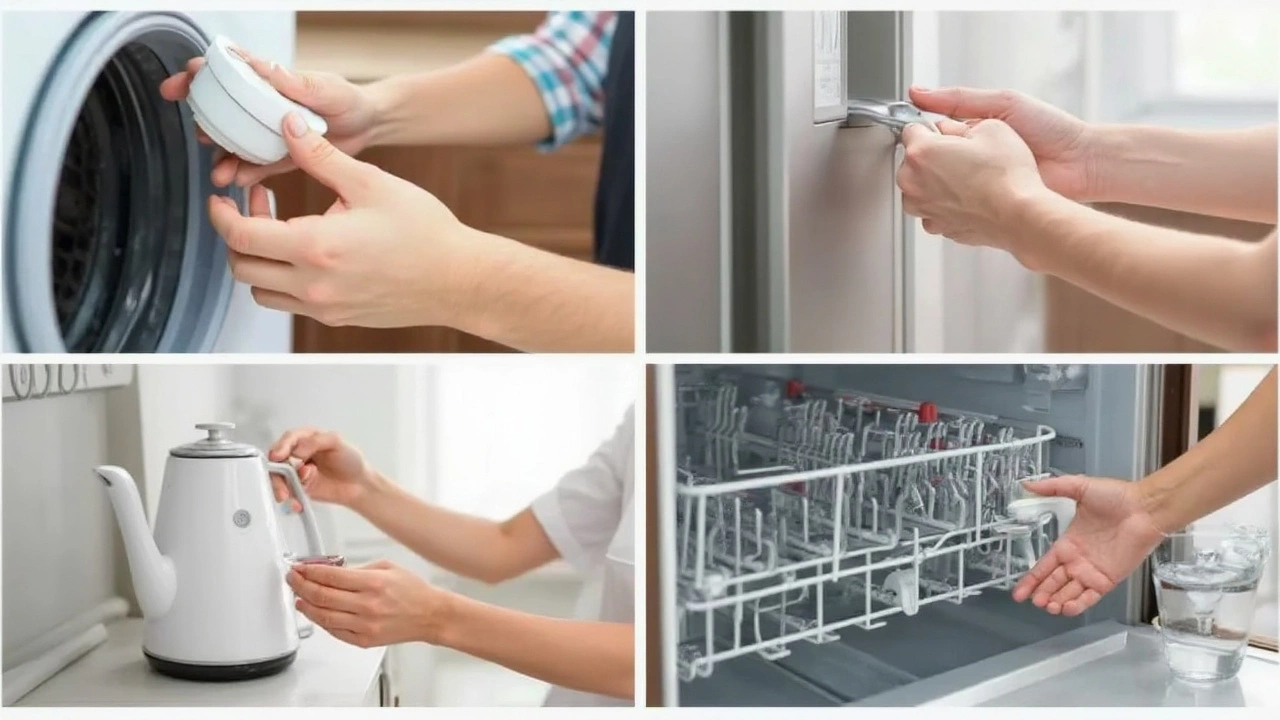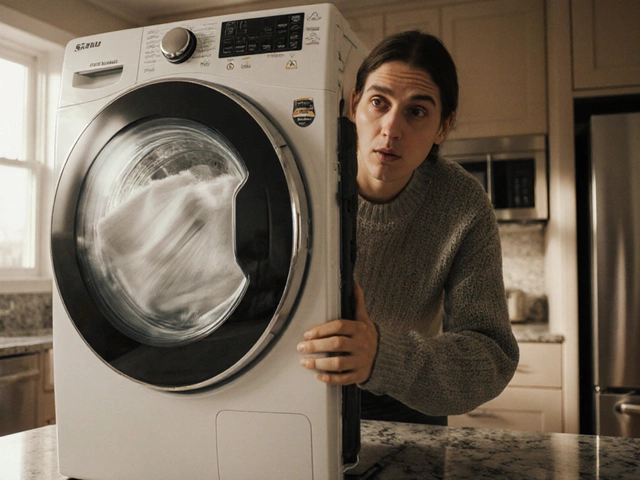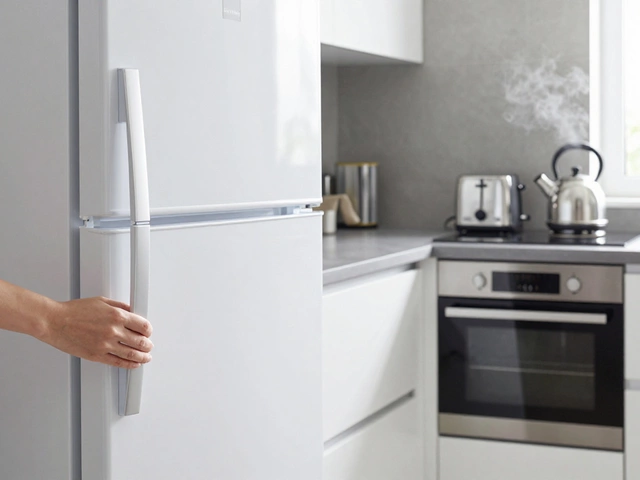Ever opened your fridge and realized how much chaos would break loose if it stopped working? Or pictured a pile of dirty dishes without a dishwasher to save the day? These appliances quietly keep our routines moving. When something goes wrong, it feels like the world stops—nobody wants food going bad or spending Sunday scrubbing plates by hand.
A lot of folks forget just how important basic care is until it's too late. Knowing a few key things about your fridge, washer, oven, and dishwasher can help you avoid headaches and big repair bills. Stick with the essentials, and your home will thank you. Let’s dig into why these four appliances matter more than you think—and what you can do to keep them humming along.
- Why These 4 Appliances Matter
- The Workhorse: Your Refrigerator
- Laundry Day Essentials: Washer & Dryer
- Cooking Made Easy: The Oven and Stove
- Staying Clean: The Dishwasher
- Quick Tips for DIY Maintenance
Why These 4 Appliances Matter
If you want your home to run smoothly, there are four appliances that basically handle the heavy lifting: your fridge, washer and dryer, oven, and dishwasher. These are the MVPs that keep food fresh, clothes clean, meals cooked, and dishes tidy. When one of them quits, daily life usually gets a lot harder (and messier) fast.
Just think about it. The average refrigerator is running 24/7, keeping hundreds of dollars’ worth of groceries from spoiling. According to Energy Star, a typical American fridge uses about 400 to 500 kWh of electricity a year. That’s more power than your oven or dishwasher, but less than a central air unit, so the fridge is a top priority for home maintenance. Even minor issues can turn into food waste—and higher bills.
The washing machine and dryer are right behind on the importance scale. Most families run these at least 4 to 5 times per week. One clog or failed part, and laundry piles up in a hurry. Same thing in the kitchen: an oven that won’t hold temp means takeout for dinner, and a broken dishwasher means your sink fills up fast. Repair costs can range from $100 for something simple, up to $600 or more if parts need replacing. The point? Staying on top of care saves money in the long run and keeps your day on track.
Here’s what makes these four appliances so critical:
- Refrigerator: Prevents spoilage and foodborne illness, cuts down on food waste.
- Washer & Dryer: Handles sweat, stains, and regular laundry—especially if you have kids or pets.
- Oven & Stove: Major player for homemade meals, baking, and food safety.
- Dishwasher: Saves time, encourages cleanliness, and even uses less water than washing by hand when fully loaded.
Want to see how often people use these? Check out this ballpark data from a typical household:
| Appliance | Typical Use per Week |
|---|---|
| Refrigerator | 24/7 (continuous) |
| Washing Machine | 4 - 5 loads |
| Oven/Stove | 5 - 7 times |
| Dishwasher | 3 - 5 cycles |
Keeping these appliances in good working order is more than just handy—it keeps things safe, saves cash, and cuts down on the stress of everyday home life.
The Workhorse: Your Refrigerator
Your refrigerator isn’t just a big cold box—it’s the heart of your kitchen. This is the one appliance that runs 24/7, quietly saving you hundreds of bucks by keeping food fresh and safe. A modern fridge keeps things between 35°F and 38°F, and the freezer side should hold steady at 0°F. Skip those ranges, and you risk spoiled milk and freezer-burned meat.
Did you know that the average refrigerator makes up about 13% of your home’s energy bill? Keeping it running smooth can cut down on waste and utility costs fast. Here’s a quick breakdown of maintenance tips that’ll keep your fridge happy:
- Clean the coils in back or underneath once or twice a year. Dusty coils make the compressor work harder and waste power.
- Don’t cram food way up against the back wall. You want cool air moving all around.
- Wipe up spills right away—gunk can turn into odors and mold fast.
- If you hear rattling or buzzing, check for loose trays or items touching the fan.
- Replace water filters regularly if your fridge has an ice maker or water dispenser. Check what’s recommended—usually every 6 months.
| Quick Refrigerator Facts | Details |
|---|---|
| Average lifespan | 13 years |
| Best fridge temperature | 37°F (3°C) |
| Annual energy cost (typical) | $65–$110 |
| Biggest enemy | Dirty condenser coils |
If you spot puddles on the floor, weird noises, or things aren’t as cold as they should be, call a pro who knows appliance service. Catching these issues early saves a lot of money and stress.
Laundry Day Essentials: Washer & Dryer
If your washer or dryer suddenly calls it quits, you feel it right away. Laundry piles up. The house starts to smell a bit musty. In most homes, these appliances work several times a week—sometimes daily if kids or sports are involved.
Washers have gotten smarter, but they’re still vulnerable to basic problems like a clogged hose, forgotten coins in pockets, or overloading. Newer front-load machines use way less water—some cut usage by as much as 40%—but that water efficiency means you really need to clean out the rubber door seal every week. Skipping it is almost a guarantee for a moldy smell after a month or two.
Dryers are all about keeping that vent clear. A lint buildup is more than just annoying—it’s the number one cause of dryer fires in homes. It cuts the dryer's efficiency and could make your home maintenance bill skyrocket if the unit overheats and breaks something major.
| Common Washer Problems | What To Do |
|---|---|
| Washer won’t drain | Check and clean pump filter |
| Leaking water | Inspect hose connections and door seals |
| Unusual noise or vibration | Clear out foreign objects, rebalance load |
If you want your washer and dryer to last more than a decade—which they usually can—stick to a few routines:
- Run regular “tub clean” cycles with white vinegar or a pre-made cleaner.
- Leave the washer door open a few inches after each load to let it dry out.
- Empty the lint filter after every dryer use.
- Check and clear the dryer vent from the back of the machine to the outside once a year. Grab a vacuum or a vent brush for this—don’t skip it.
- Don’t overload the machines. The motors and belts will thank you.
You don’t need professional service every year, but don’t ignore weird noises, water on the floor, or unusually long drying times. Catching these little issues early will save you a lot of money. If you ever spot a burning smell or sparks around your dryer, unplug it instantly and get an expert on the phone—that’s an emergency.

Cooking Made Easy: The Oven and Stove
Your oven and stove are at the heart of the kitchen. Whether you’re baking pizza, boiling pasta, or just making breakfast, these appliances fire up the action. They might look rock-solid, but even the best ovens and stoves need some love if you want them to last.
Let’s talk about upkeep first. The biggest issue with ovens? Baked-on grime and spills. If you ignore messes, you’ll end up with weird smells and uneven cooking. Most ovens have a self-clean feature, but you should still wipe spills as soon as things cool down. For gas stoves, keep burner holes clear or you’ll get weak flames. For electric stoves, be careful with cracked glass tops—those are expensive to replace.
- Check burners and heating elements regularly for food debris or build-up.
- If you smell gas but the stove won’t light, turn everything off and ventilate—never ignore gas smells. Call a pro if you’re not sure what’s wrong.
- Calibrate your oven if you notice food is always over- or under-cooked. Most ovens let you adjust the temperature up or down a bit; your manual shows how.
- Swap out old oven door gaskets (the rubber or silicone seal) if you see cracks—heat escapes fast through a bad seal, and your oven works overtime.
People often ask how much energy ovens and stoves use. Here’s a quick look at average annual electricity costs for common models in the US:
| Appliance | Annual Cost ($) | Average Use (hrs/week) |
|---|---|---|
| Electric Oven | 35 | 5 |
| Electric Stove | 16 | 7 |
| Gas Oven | 19 | 5 |
| Gas Stove | 9 | 7 |
If you use the self-clean feature, do it right after cooking so the oven is already warm—saves time and energy. And honestly, if you’re ever unsure or something doesn’t sound or look right, call a trusted appliance service expert instead of guessing. Problems with ovens and stoves can mean safety issues, and you don’t want to take risks there. Regular check-ups keep things safe and your food tasting just the way you like it.
Staying Clean: The Dishwasher
When it comes to keeping chaos out of the kitchen, the dishwasher is a real MVP. Most people use it every day, which makes it one of the hardest-working appliances at home. Here's a surprise — the average dishwasher can use just 3-4 gallons of water per load, while hand washing a similar load uses up to 27 gallons. That means your dishwasher doesn't just save time, it saves money and water too.
If your dishes are looking gritty or coming out cloudy, don't rush to blame the machine. Hard water, clogged spray arms, or a dirty filter are usually the culprits. Dishwashers need some love to keep doing the heavy lifting. At least once a month, check the filter at the bottom — rinse it out to prevent funky smells and buildup. Got a spray arm that's not spinning right? Take it off and clear out any gunk stuck in the holes.
Ever notice a weird odor? Grease and bits of food can get stuck inside, which can get gross fast. To dodge this, run an empty cycle with a cup of white vinegar on the top rack. It’s a simple trick that keeps the inside fresh and smelling clean.
Think loading style doesn’t matter? It actually does. Put bowls and cups facing downward, stack plates so nothing blocks the spray, and don’t overload the racks. That’s the best way to get every surface clean and save your appliance from working overtime.
- Check and clean the filter once a month.
- Use the right amount of detergent — more isn’t always better.
- Run hot water in your sink before starting a cycle for better cleaning.
- Leave the door open after a cycle to dry out and prevent smells.
| Dishwasher Use | Water Used (per load) |
|---|---|
| Dishwasher | 3-4 gallons |
| Hand Washing | 27 gallons |
Look out for leaks, odd noises, or cycles that won’t finish. These signs usually mean it’s time for a repair — sometimes just a simple seal or a clogged filter fix. Regular TLC will save you on costly appliance service calls and keep your dishwasher running for 10 years or more.
Quick Tips for DIY Maintenance
You don’t need to be a professional to keep your appliances working their best. A little regular attention can save you big bucks and loads of hassle. Here are simple things you can do to extend the life of your home gear.
- Refrigerator: Every 6 months, clean out those condenser coils with a vacuum or soft brush. Dust and pet hair make the fridge work harder. Check the door seal by slipping a dollar bill in the door—if it slides out easily, it’s time for a new gasket.
- Washer: Always leave the door open after a wash to let it dry and prevent mold. Once a month, run an empty hot cycle with two cups of white vinegar to keep the drum fresh and odor-free.
- Dryer: Lint build-up is a fire risk. Clean the lint trap after every load and vacuum out the vent tube at least twice a year. If your clothes are taking longer to dry, the vent is probably clogged.
- Oven and Stove: For gas stoves, check burner holes for clogs and clean them with a pin. Ovens with self-cleaning settings should still be wiped down afterward—ash leftovers can mess with performance.
- Dishwasher: Remove and rinse the filter each month to stop food scraps from building up. Wipe the door seal and spray arms so they don’t get blocked by gunk.
If you want to see what a little maintenance can do, here’s what research from appliance companies found about DIY care and repair:
| Appliance | Regular Cleaning Reduces Repairs By | Average Maintenance Time (Yearly) |
|---|---|---|
| Refrigerator | 34% | 2 hours |
| Washer/Dryer | 28% | 3 hours |
| Oven/Stove | 19% | 1.5 hours |
| Dishwasher | 35% | 2 hours |
None of these jobs take a ton of time, but if you ignore maintenance, you pay more later—either in appliance service calls or replacement costs. Whenever in doubt, check your manual or look up a quick video. Most fixes are easier than you think, and a little effort now can keep things running smoothly for years.




